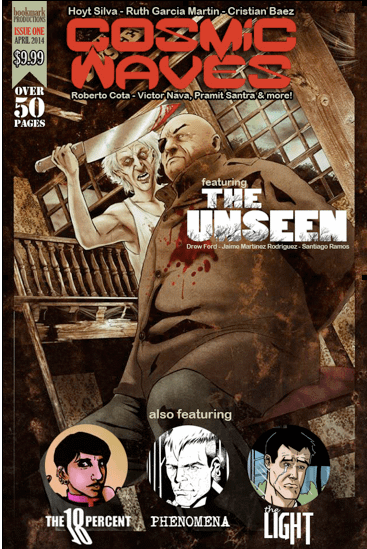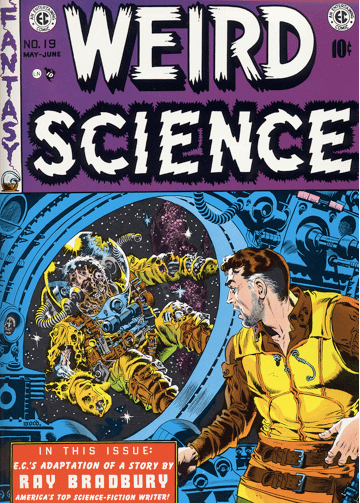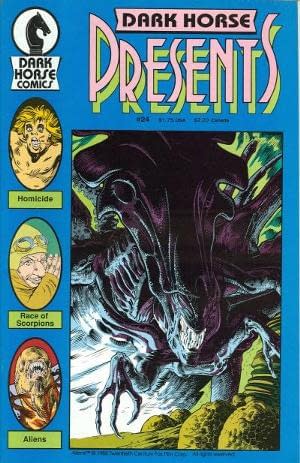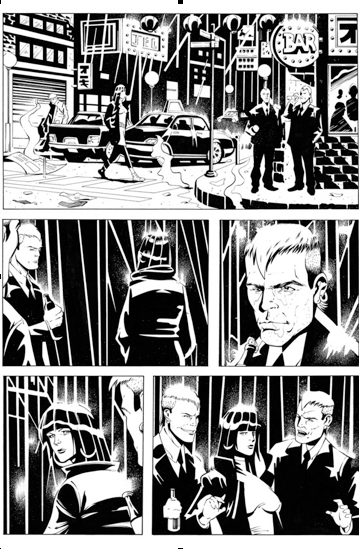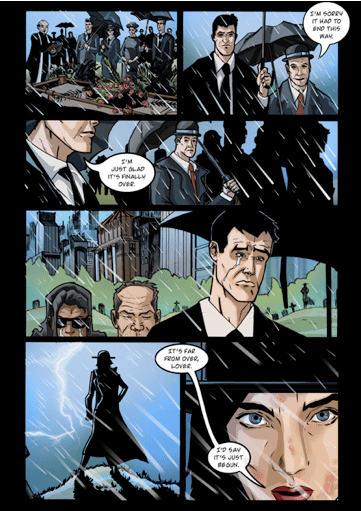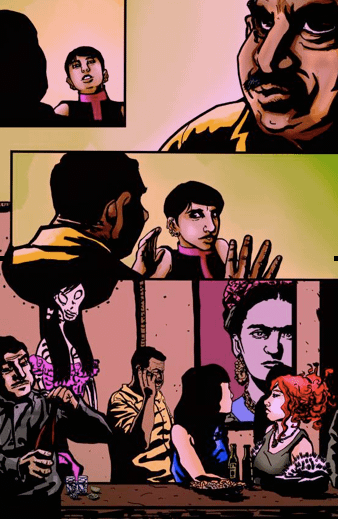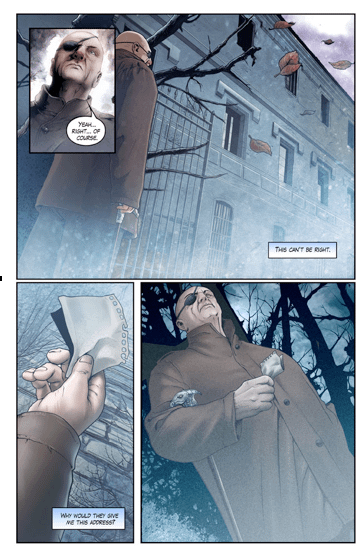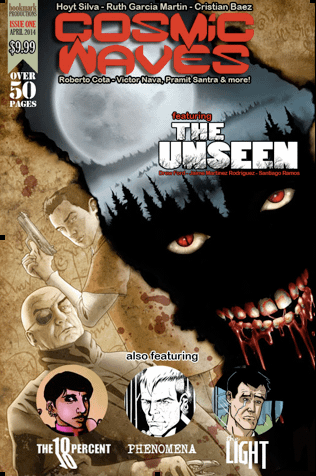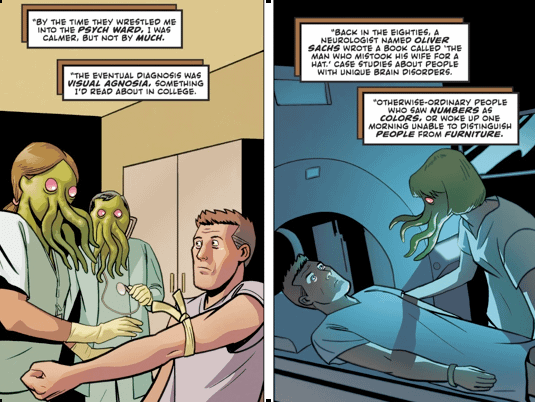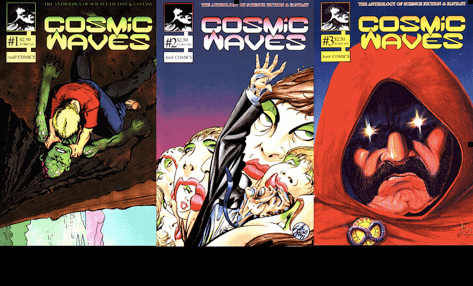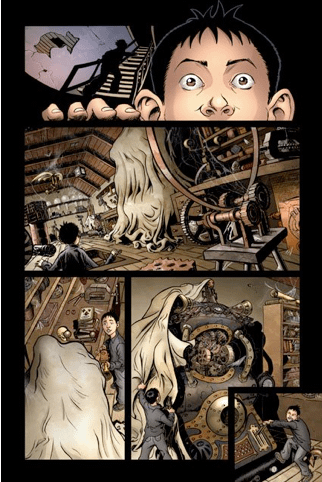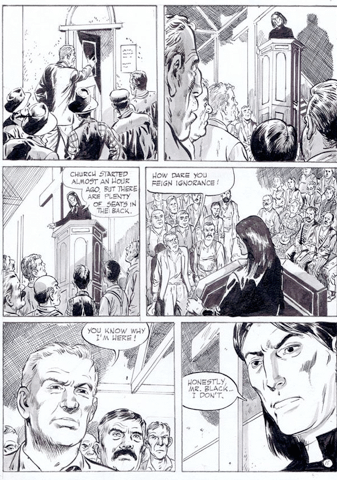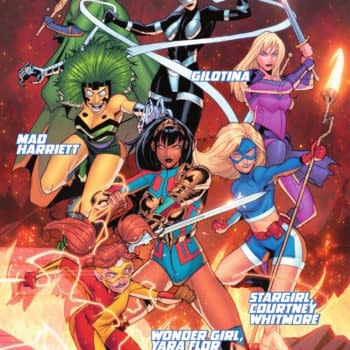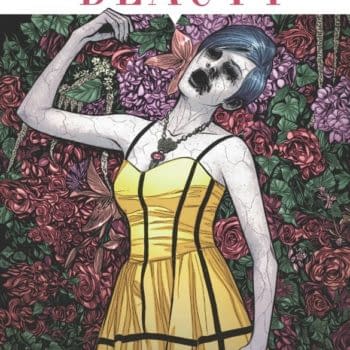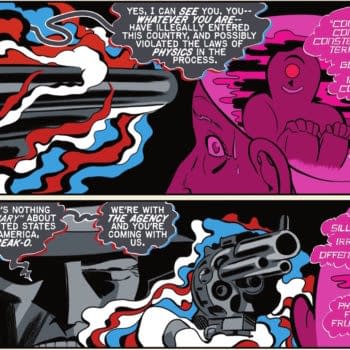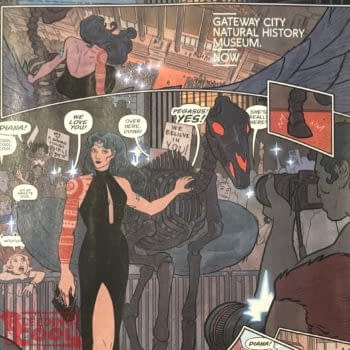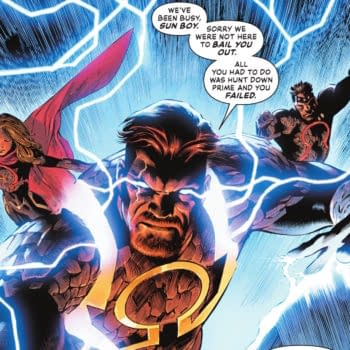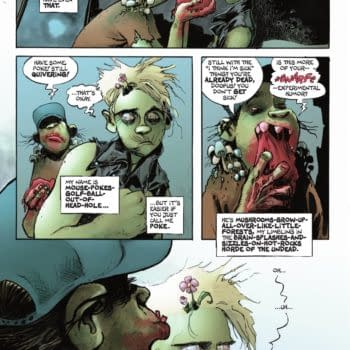Posted in: Comics, Recent Updates | Tagged: Carmine Street Comics, Comics, Cosmic Waves, crowd funding, dark horse presents, Drew Ford, ec, entertainment, Jon Gorga
Anthologies, Digital Comics, Crowd-Funding And The Evolution of Comics – Jon Gorga and Drew Ford in Conversation
A discussion between retailer Jon Gorga and creator Drew Ford:
Jon Gorga, co-owner of Carmine Street Comics in the West Village district of New York City, sat down recently with comic book creator Drew Ford to discuss a number of his upcoming projects, including Cosmic Waves, a comic book anthology he is trying to publish through the help of crowd-funding. The conversation quickly shifted from personal projects to wider questions about the industry as a whole, and while all mysteries associated with our beloved universe of comics may not be revealed, it ends up being a pretty interesting ride.
Jon Gorga: One of my favorite things to put in a customer's hand is an anthology because it allows so many more opportunities to spark love for a new genre or a new artist or a new character in someone's brain than an individual issue or a graphic novel. But the truth is they're also among the hardest sells; people like knowing what they're getting into. What sets Cosmic Waves apart in overcoming this?
Drew Ford: When you look at most contemporary comic book anthologies, you will usually see an incredibly wide variety of stories within their pages. You will see everything from straightforward adventures to wildly conceptual experiments in storytelling. While having such collections is definitely important to the overall development of comics as an art form, it can also be, as you stated, a very tough sell…especially to a more mainstream audience. So, while I might like to try something like that down the road, for Cosmic Waves, I wanted to keep it exciting and entertaining to the widest audience possible. I'm doing this by keeping it very genre oriented. Science Fiction, Fantasy, Horror, Mystery, Crime, etc. In my personal experience, I have known many folks who feel quite comfortable moving easily between these different forms of genre storytelling.
With this in mind, I decided that we would set out to thrill, scare and astonish with Cosmic Waves, making the reader truly excited to read the second issue. While I would never compare our stories to those found between the legendary covers of EC classic anthologies, I did try to take a page from their playbook by producing a collection of stories that would, above all else, entertain the reader. For example, our first issue contains a ghost story, a horrific crime drama, a science fiction thriller, and even a love story cloaked in the guise of a super hero tale. I truly believe that, if folks actually give this book a chance, our emphasis on this type of storytelling will be what sets us apart from anything that is out there.
JG: So thrilling genre work is the goal here! You hold the classic EC anthology titles in high regard obviously, but what would you say is the model, if any, for Cosmic Waves? And secondly, what's your favorite all-time comics anthology? Do your answers make those the same question, at the end of the day, or contrasting ones?
DF: The answer to both your questions is Dark Horse Presents. And similar to Dark Horse Presents, we will present both stand-alone stories, and ongoing serials. Of course, DHP is a comic book institution, and even though they do a lot of exciting, straightforward comic book storytelling, they are able to experiment a bit more than us. As mentioned before, maybe someday, but not right now…and not with Cosmic Waves.
JG: Let's talk about one of those ongoing stories now, Phenomena; because I'm terribly curious as to what you mean by "a contemporary ghost story". It makes me imagine the Henrik Ibsen play set in the present but with actual ghosts. It's probably nothing like that, tell me about it.
DF: Nothing as controversial as Ibsen's plays, I'm afraid. I simply meant it was a ghost story set in the present, or perhaps the not-so-distant future (you'll have to read it to find out which!). Phenomena tells the story of twin sisters who die as a result of a terrible accident. The two find each other on the "other side", but when EMTs arrive on the scene, they are only able to revive one of them. Almost immediately, the surviving sister finds that she has a direct connection with her recently deceased twin, because she herself had died, allowing the two to bond -albeit briefly- in the afterlife. From here we watch as the surviving sister accidentally uses her new psychic abilities to save a politician's child and eventually is forcefully teamed up with a miserable old detective, to investigate cases that most would deem inexplicable.
JG: Ah, so it's a near-future buddy-cop ghost story! Cool! Okay let's jump over to talk about another ongoing story you're planning to feature. In an industry in which the long-underwear characters have held dominance almost without break since 1938, what is the purpose of including your own superhero story among the offerings, and what makes The Light different?
DF: First off, I love super hero comics. Always have, always will. And while I respect the fact that some folks believe that super heroes have been done to death, and we don't need anymore of them, for me that will simply never be true. Beyond all that, I had what I felt was a pretty cool idea for a story which happened to feature super powered individuals, and I just really wanted to share it with everyone. And to be fair, beneath everything else, The Light is a straight up love story. I should also mention that I'm probably going to continue disappointing folks who don't want new super hero stories, as I am currently developing another super powered tale for a future issue of Cosmic Waves. Fair warning.
JG: Opinions around the superhero genre have changed so much in so many different strange ways over the past thirty years, haven't they? The mainstream has embraced the characters as pop-cultural icons stronger than perhaps ever before while the major creators of the comics industry are getting increasingly dismissive of the genre and its potential. You've seen these changes first-hand selling self-published and then small-publisher comics in the trenches next to Brian Michael Bendis twenty years ago and doing freelance and contract work for the Big Two and Dark Horse over the past ten years. Tell me about how you see the industry and its dramatic changes over the two decades you've worked in comics?
DF: In order for the general public to embrace fictional characters as icons, they need to be broken down to their lowest common denominator. You can't expect folks, who haven't been tuning in every month for the last I don't know how many years, to handle a movie or television show that picks up where the comic book left off last month. You need to create something that works with the largest possible audience. And when studios make a big budget movie, they expect big profits (because they are taking big risks). The Avengers movie made somewhere in the neighborhood of $1.52 Billion. Yeah, I know. Now, I mean no disrespect when I say this (because I am one of you), but that didn't come solely from the wallets of monthly comic book subscribers.
Therefore, it may be true that a lot of what is being done right now in mainstream super hero comics is in service to the movies, television shows and even video games, which have begun starring these beloved characters. Because of all that, some creators have definitely begun to show these dismissive attitudes of which you spoke. When a lot of what they are creating needs to line up with all this other media, some have begun to argue that it's tough to be innovative. And the more this happens, the more complaints you hear about it grinding away at the creative spirit.
But, as we have always seen in comics, great super hero stories will always find their way into the hands of the readers. And while this new desire to boil them all down to their basic essence for the latest movie or TV show to succeed does pose a new challenge for the folks trying to create new stories, I think creators need to approach it as just that…a challenge. The potential of super heroes is only limited, as it always has been, by our imaginations. And if it's true that this new found mainstream acceptance of super heroes has made creating the source material more difficult, that may be just the impetus needed to take us to the next level of heroic storytelling.
JG: Yeah, I think a lot of both readers and creators have begun to fear that the big corporations that own the major superhero comics publishers only think of their line of books as the R&D for more lucrative media-adaptations. Sadly, it may be true, but you are exactly right: That just makes it another challenge.
DF: Agreed. Getting back to your main question, yes, comics have changed. But other than the stuff I was talking about previously, I think the ways in which comics are created and distributed have changed more so than comic storytelling itself. The Internet has played a major role in this. And, in my opinion, there are more opportunities to get your work out there…even if it never sees the printed page, then ever before. Web and digital comics in particular have offered many creators the opportunity to share their stories with folks, that 20 years ago may never have seen the light of day.
These type of comics also allow creators to produce, publish and immediately submit their work to larger publishers. Of course, most big publishers will tell you the best way to break in is still to head out to a convention with your portfolio, and this may very well be true for artists. But the digital and web comics route has become a very viable platform to share your work with a lot of people, and one of the only ways for writers to be recognized by publishers (as most big publishers don't really look at sample scripts the same way they look at art portfolios). Beyond the idea of breaking in, the Internet is simply an awesome new place to share your stories with everyone (especially if you don't have the cash to send your book to a printer). Of course, if you have a book that people will get behind, you can take it beyond the Internet into the physical world (even if you can't afford it) through crowd-funding websites. Crowd funding is also something that definitely wasn't available 20 years ago.
JG: In the new digital world, the opportunities open to a comics-creator multiply almost to point of creating a comic-book Hamlet complex. PDFs for previews. PDFs as final products. Webcomics. Motion comics. (Which, well, are sort of not-comics, but let's not go there.) Dedicated apps. Selling through a digital retail platform. Tell us a bit about the specifics of how you're using the digital option to bring Cosmic Waves to new audiences.
DF: To start with, once funded, we will be producing a simple PDF file of Cosmic Waves #1 (containing some material only available to those who helped fund us through the initial campaign), which will either be e-mailed or made available for download with a password (still working out the logistics). But in the future, a slightly different version of the same book may be available through several different digital distribution avenues, depending on what types of deals we can secure.
JG: Keeping the options open I see! Speaking of digital, how do you feel about the way it's changed the industry as well as the medium itself from the way this all worked twenty years ago? Has one been changed more than the other by it?
DF: I think anything that can put comic books into more hands is always a good thing. In fact, I heard from a few retailers that many folks who discover comics for the first time in their digital form eventually seek out their physical counterparts in a local comic book store. Imagine that, digital comics helping local comic book stores sell more floppies!
JG: It's rare but I've seen it! I, too, am just in favor of anything that get's more comics into the hands and under the eyeballs. What do you think about the storytelling potential? Stuff like the point-and-click altering panels Mark Waid is doing online? Is it still the same art form, in your mind?
DF: Well, comic strips somehow gave birth to comic books, without becoming extinct themselves. Many would say that the comic strip is a very different art form than the comic book, yet they both continue to hold an important place in American pop culture. So, will these new digital, point and click stories become something different than the printed comic book? Probably. But will that render the traditional printed comic book useless? Hardly. Just as comic strips gave birth to comic books without destroying themselves in the process, I think comic books can easily give birth to another similar form of storytelling, while they continue to thrive, and even evolve, in their own creative space.
JG: Damn good point! Evolution does not always have to be followed by extinction. Let's refocus on the book itself, what are some of your plans for stand-alone comics-shorts and how will they fit-in with your stable of ongoing stories?
DF: Most of the stand alones are stories I have wanted to tell for some time, but just didn't have a place to present them. I thought about putting them on my website in the past, but now that I am putting together Cosmic Waves I'm glad that I waited. Also, I MAY release one OLD story each issue just for fun. Meaning, one of my short stories (of which I have several) from around 20 years ago!
JG: Very cool! So we might be seeing a window into the '90s indie scene every issue too! Before this ends I really want you to talk about your two graphic novel projects as well. First, give us a vision into the world we'll be seeing in Steam.
DF: Steam is a story about the past being transported to another world. I don't want to say too much more, mostly because I don't wanna spoil the story before it's published. As for its connection with Steampunk, I would say that Steam is a contemporary, if not unusual, take on the Steampunk genre.
JG: A mere tease! Please tell us more about the work of yours I've always been the most excited to get peeks of: Freakestate.
DF: Freakestate is a murder mystery set in 1933. But the mystery really has more to do with why the murderer does what they do, as opposed to who the murderer might be. When you think about Freakestate, think about this…If a village can raise a child to become a healthy, productive member of society, couldn't they also create a cold-blooded killer?
JG: Everything you show/tell me of Freakestate just gets me more excited! At the final stretch, Drew, how can readers of this interview help Cosmic Waves get funded and when can we expect to see the book printed and in our hands?
DF: Anyone interested in helping us fund the publication of Cosmic Waves can make a contribution on the campaign page here.
Once the book is funded, it' scheduled to be released by the end of April of next year (2014).
JG: Thanks for taking the time to do this, Drew! We're looking forward to putting Cosmic Waves #1 on the rack at Carmine Street!
Jon Gorga's thoughts on comics and more can be found here: http://www.longandshortbox.com/
Drew Ford's website, which currently has a free preview of Cosmic Waves, can be seen here: http://cargocollective.com/drewford/


